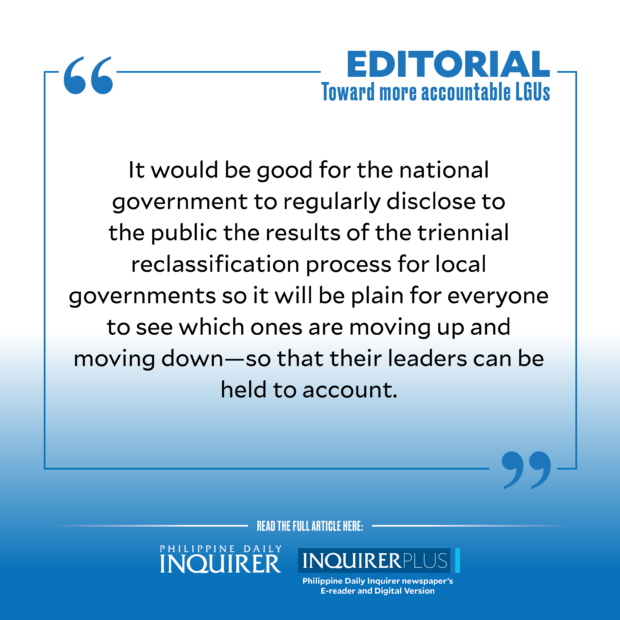Toward more accountable LGUs

It is hereby declared the policy of the State that the territorial and political subdivisions of the State shall enjoy genuine and meaningful local autonomy to enable them to attain their fullest development as self-reliant communities and make them more effective partners in the attainment of national goals.”
Thus reads the declaration of policy of the Local Government Code of 1991 whose goal is to get provinces, cities, municipalities, and barangays to stand on their own two feet independent of the national government.Over three decades ago, enlightened leaders like the late Sen. Aquilino Pimentel Jr.—the champion of this landmark piece of legislation—envisioned local officials being able to solve local concerns more efficiently and more rapidly without having to wait for orders or resources from the far-off national capital.
Three decades on, the journey remains unfinished and progress remains uneven.
On one hand, some local government units are so well-run and wealthy that they could rival the national government in terms of resources and responsiveness to their constituents.
On the other hand, some barangays, municipalities, cities, and even provinces are so poorly administered and mismanaged that it’s a surprise their citizens haven’t used the power of the ballot to boot their leaders out yet.
But last week saw this country make a significant leap forward on this path of empowering local communities after President Marcos enacted Republic Act No. 11964 or the Automatic Income Classification of Local Government Units Act.The new law classifies provinces, cities, and municipalities into five classes according to their income ranges, based on the average annual regular income for three fiscal years preceding a general income reclassification.
Henceforth, local governments earning annual incomes of P200 million or more will be classified as first-class municipalities; those with annual incomes of P160 million will be in the second-class tier; those earning at least P130 million will be lodged as third class; fourth class for those making at least P90 million; and fifth class for those reporting annual incomes of below P90 million.
At the same time, the law provides for a periodic reclassification of local governments across the country. Every three years, these local governments may see their standings rise or fall in this five-tiered bracket, providing national policymakers with a more accurate and updated picture of what specific communities are capable (or incapable) of.
This is important because the last time local government classifications were reviewed was a decade and a half ago. Since then, some have improved significantly, requiring less support from the national government, while some have undoubtedly deteriorated, thus requiring more assistance from the capital.
Under the old scheme, national leaders’ information was often outdated and policies were being made and resources allocated based on imperfect information. No longer.
The new law which mandates the regular review and periodic classification process will provide all stakeholders with an unassailable empirical gauge for measuring the concerned community’s progress or lack of it.
As such, it will give their citizens an accurate picture of whether the leaders tasked with administering their locales are doing well or poorly. Whether a local government moves up or down this scale or stays stagnant, may very well be made a basis for voters to decide whether their current leaders deserve fresh mandates in running their cities and municipalities come the next elections.
To this end, it would be good for the national government to regularly disclose to the public the results of the triennial reclassification process for local governments so it will be plain for everyone to see which ones are moving up and moving down—so that their leaders can be held to account.
In the second section of the 1991 Local Government Code, it stated that “the State shall provide for a more responsive and accountable local government structure instituted through a system of decentralization whereby local government units shall be given more powers, authority, responsibilities, and resources.”
Indeed, governors, mayors, and barangay captains have had more power, authority, responsibilities, and resources in the 32 years since that law was enacted. But something is lacking.
This latest law in our journey toward local empowerment—and the transparency it provides for citizens who want clearer pictures of how their communities stand vis-à-vis their peers—may very well have the key ingredient that is all too often missing in getting their governors, mayors, and barangay captains to perform better: accountability.




















